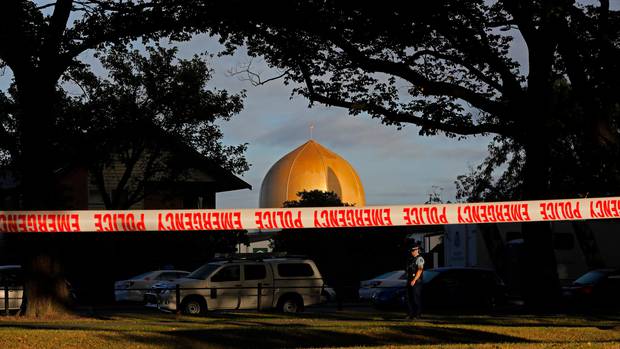
How can we – Muslims and non-Muslims together – prevent another atrocity like the one in Christchurch? As I have watched New Zealanders of all faiths mourn, this has been the question on my mind. So far, few of the answers offered have come close to the truth.
What the massacre revealed was the need for a clear understanding of the weaponisation of ethnic, religious and political identities that is going on throughout the world. This was Brenton Tarrant’s evil aim: to contribute to a polarisation of the West – and to a parallel phenomenon in the Muslim world. His actions, which eerily resemble those of Isil and other Islamist terror groups, were calculated to intensify the hostility and suspicion that already exist towards Muslims in the West. They were also designed to elicit a response from Islamists and so encourage a cycle of retaliatory violence.
We must not let him, or anyone else, succeed. Solidarity across racial, religious, cultural and political lines to address this global crisis is the only answer. But this means resolutely acknowledging the causal factors of the violence that we are seeing in so many parts of the world. As a Muslim, this leads me to questions that require difficult but honest answers.

Why, for example, did the attacker emblazon a weapon with the name of Charles Martel, who defeated a Muslim army in Poitiers, France, in 732AD? It is obvious from his manifesto that he is an unabashed white supremacist. Yet the many historical references it contains are also evidence of a fixation upon nearly 1400 years of armed conflict between Muslims and non-Muslims, and an acute awareness of moments when the tide of Muslim conquest, which repeatedly threatened to inundate Europe, was turned back. From there, the attacker’s fixation turned to more recent events: repeated Islamist terror attacks in Europe. For instance, he specifically referenced the death of Ebba Akerlund, an 11-year-old Swedish girl who was killed in an Islamist terror attack in 2017.
As much as it may be uncomfortable for many, this deserves more focus. The targeting of Muslims at prayer in Christchurch comes after nearly two decades during which Islamist atrocities have been a pervasive feature of news bulletins around the world. The massacre in New Zealand would likely be inconceivable if divorced from this wider context in which Islam has become synonymous with terror in the minds of many non-Muslims.
Sadly, from an Islamist perspective, the Christchurch atrocity is simply part of an ancient cycle of violence. Of course, most Europeans do not view themselves as being “at war” with Islam. But to a significant percentage of Muslims, this is simply because Westerners have been enjoying the peace of the victor, which Islamists seek to challenge. This is why Christchurch is such a dangerous moment.
Ending the cycle of violence requires addressing not only the ideology and motivations of someone like Tarrant, but also the historical framework he shares with many Muslims. That is, that Muslims and non-Muslims are and shall remain in a state of permanent conflict, until the end of time (according to Islamists) or the disappearance of Islam (according to advocates of a “counter-jihad”).
Among Muslims and non-Muslims, there is an urgent need to address those obsolete and problematic elements of Islamic orthodoxy that underlie the Islamist worldview, fuelling violence on both sides. The world’s largest Muslim organisation, Indonesia’s Nahdlatul Ulama, of which I am General Secretary, has begun to do exactly that.
The truth, we recognise, is that jihadist doctrine, goals and strategy can be traced to specific tenets of orthodox, authoritative Islam and its historic practice. This includes those portions of Shariah that promote Islamic supremacy, encourage enmity towards non-Muslims and require the establishment of a caliphate. It is these elements – still taught by most Sunni and Shiite institutions – that constitute a summons to perpetual conflict.
It is our firm view that, if Muslims do not address the key tenets of Islamic tradition that encourage this violence, anyone – at any time – can harness them to defy what they claim to be illegitimate laws and butcher their fellow citizens, whether they live in the Islamic world or the West. This is what links so many current events, from Syria to the streets of London.
There is a desperate need for honest discussion of these matters. This is why it worries me to see Western political and intellectual elites weaponise the term “Islamophobia,” to short-circuit analysis of a complex phenomenon that threatens all humanity. For example, it is factually incorrect and counter-productive to define Islamophobia as “rooted in racism,” as proposed by the All-Party Parliamentary Group on British Muslims. In reality, it is the spread of Islamist extremism and terror that primarily contributes to the rise of Islamophobia throughout the non-Muslim world.
That is why it is vital to challenge the prevailing “Muslim mindset,” which is predicated upon enmity and suspicion towards non-Muslims, and often rationalises perpetrating violence in the name of Islam. Otherwise, non-Muslims will continue to be radicalised by Islamist attacks and by large-scale Muslim migration to the West.
We appeal to people on both sides of the political divide in the West, of all faiths and none, to renounce the practice of weaponising Islam for partisan advantage, and join us in the desperate struggle to reform obsolete and problematic tenets of Islamic orthodoxy, rather than bequeath a tragic legacy of hatred and violence to future generations.
Yahya Cholil Staquf is General Secretary of Nahdlatul Ulama, the world’s largest Muslim organisation


Another writer who accepts the official narrative of the Christchurch “shootings” – and, apparently, of all other “terrorist attacks” in recent history. He needs to do some serious research, and to start this by watching “The Boston Unbombing” at https://archive.org/details/March29doneTheBostonUnbombing18